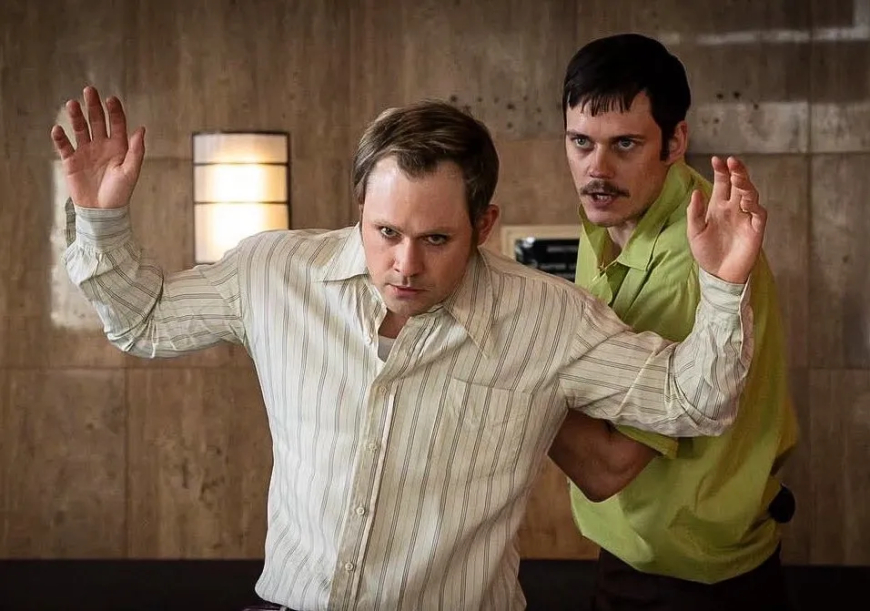Dead Man’s Wire at Venice: Bill Skarsgård’s True-Crime Turn Draws Parallels to the Luigi Mangione Case
At Venice 2025, Bill Skarsgård stars in Dead Man’s Wire, a thriller inspired by the Luigi Mangione case. Director Marco Rinaldi links true crime to today’s political climate.

The 82nd Venice International Film Festival is buzzing with anticipation around Dead Man’s Wire, a taut new thriller starring Bill Skarsgård. The film, directed by acclaimed Italian filmmaker Marco Rinaldi, has drawn comparisons to the notorious Luigi Mangione case — a decades-old murder mystery still haunting Italy’s legal and cultural memory. With its combination of real-world parallels, searing performances, and timely commentary, the film has already positioned itself as one of the festival’s most talked-about premieres.
Bill Skarsgård’s Bold Step Into True Crime
Skarsgård, best known for his chilling role as Pennywise in It and his breakout performance in Clark, takes on the demanding role of an investigative journalist unraveling a web of corruption tied to political elites and organized crime. His character, Luca Benedetti, risks his career and life to expose a network of illegal surveillance operations that eerily resemble tactics documented in the Mangione trial files.
Speaking at a press conference on Wednesday, Skarsgård said: “This was the most personal and terrifying role I’ve taken on. It forced me to ask what truth costs when institutions want it buried.”
The choice to cast Skarsgård reflects Rinaldi’s intent to merge international star power with Italy’s unresolved reckoning over state secrecy and mafia entanglements.
Parallels to the Luigi Mangione Case
The Luigi Mangione case, which erupted in the late 1990s, involved allegations that the businessman’s murder was tied to surveillance tapes implicating political insiders. The investigation was mired in controversy, with evidence disappearing and multiple witnesses retracting testimony under suspicious circumstances.
Dead Man’s Wire never mentions Mangione by name, but the thematic overlap is unmistakable. Director Marco Rinaldi acknowledged the inspiration during a Q&A: “We didn’t set out to retell the case, but rather to explore the shadowy spaces where truth is traded like currency. The Mangione affair is part of Italy’s DNA in that regard.”
The film’s title itself — referencing hidden microphones and covert recordings — underscores its resonance with ongoing debates about privacy, surveillance, and corruption in Europe.
Festival Reception and Early Reviews
Venice audiences responded with a six-minute standing ovation after Tuesday night’s screening at the Sala Grande. Critics were quick to highlight both Skarsgård’s intensity and the film’s unflinching realism.
According to The Guardian, the thriller “walks a razor’s edge between procedural detail and moral outrage,” making it as much an indictment of systemic rot as a piece of cinematic storytelling.
Festival-goer Martina Leone, a 34-year-old law student from Milan, told reporters: “It feels like the Mangione case is alive again. Watching Skarsgård piece together evidence on screen was like watching history repeat itself — with all the same silences and denials.”
A Film Rooted in Current Events
What makes Dead Man’s Wire particularly timely is how it intersects with today’s political climate. As European governments grapple with cybersecurity threats, whistleblower protections, and the ethics of surveillance, Rinaldi’s thriller places these issues under a harsh spotlight.
Dr. Alessio Romano, a political scientist at Sapienza University in Rome, told Euronews: “The film may be set in the late 1990s, but its relevance in 2025 is undeniable. From Pegasus spyware scandals to parliamentary inquiries, the questions it raises about transparency are urgent.”
This fusion of past and present elevates Dead Man’s Wire beyond a crime drama, transforming it into a cultural conversation piece.
Director’s Vision
Rinaldi, who previously won acclaim for The Silent Tribunal, has long been interested in stories where personal conscience collides with institutional power. In his director’s notes, he described Dead Man’s Wire as “a meditation on the fragility of memory and the resilience of those who refuse silence.”
He also emphasized the importance of authenticity. Production notes detail how the crew studied declassified trial records and filmed in real judicial chambers in Naples to ground the narrative in historical texture. Costume and set designers reconstructed the look of late 1990s Italy with meticulous accuracy, down to period-appropriate technology like bulky wiretaps and tape recorders.
Awards Season Potential
With its Venice debut generating buzz, speculation is already building about Dead Man’s Wire’s awards-season trajectory. Skarsgård’s performance is being floated as a possible Best Actor contender, while Rinaldi could secure recognition in international film categories.
According to Variety, Paramount’s acquisition team is in discussions to secure global distribution rights, with a release strategy targeting both European arthouse circuits and U.S. awards season windows.
Final Word
Dead Man’s Wire is more than just a thriller. It’s a cinematic excavation of Italy’s unresolved past and a mirror to present-day concerns about corruption and surveillance. With Bill Skarsgård’s transformative performance, Marco Rinaldi’s uncompromising direction, and its chilling parallels to the Luigi Mangione case, the film has set the tone for Venice 2025 — where art and politics collide under the spotlight.
As festival buzz grows, one question lingers: will Dead Man’s Wire spark not just awards chatter, but also renewed public scrutiny of the truths still buried in Italy’s shadows?
What's Your Reaction?
 Like
0
Like
0
 Dislike
0
Dislike
0
 Love
0
Love
0
 Funny
0
Funny
0
 Angry
0
Angry
0
 Sad
0
Sad
0
 Wow
0
Wow
0







































































